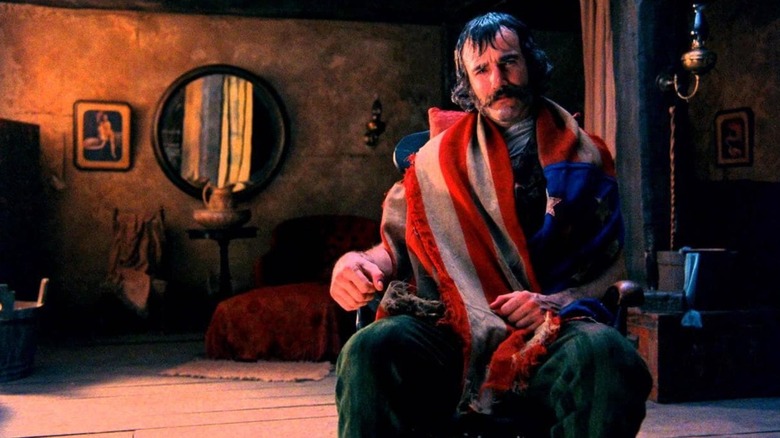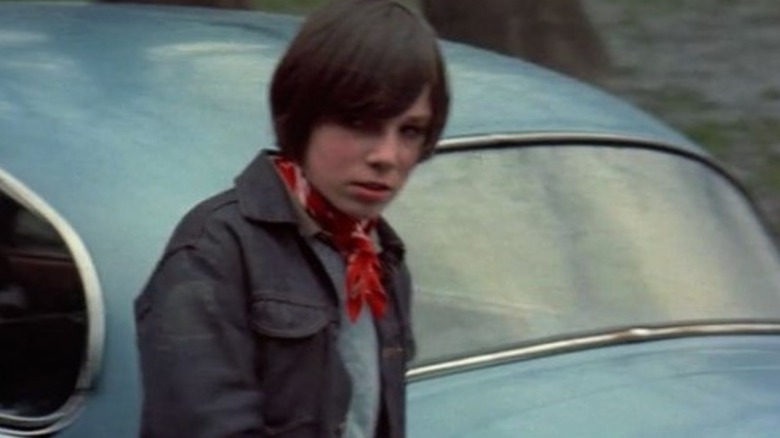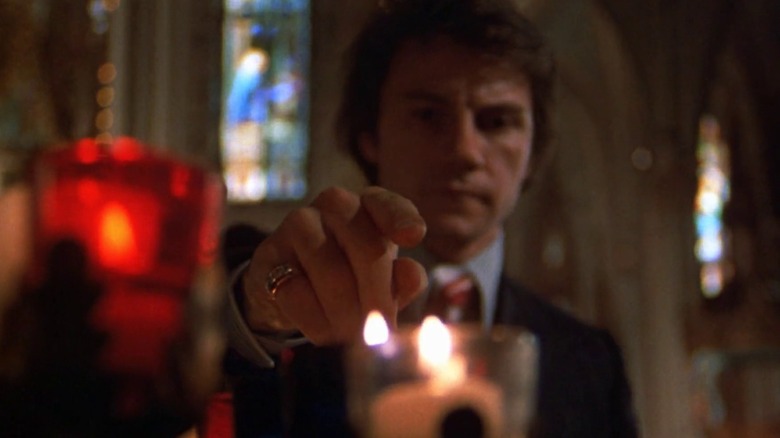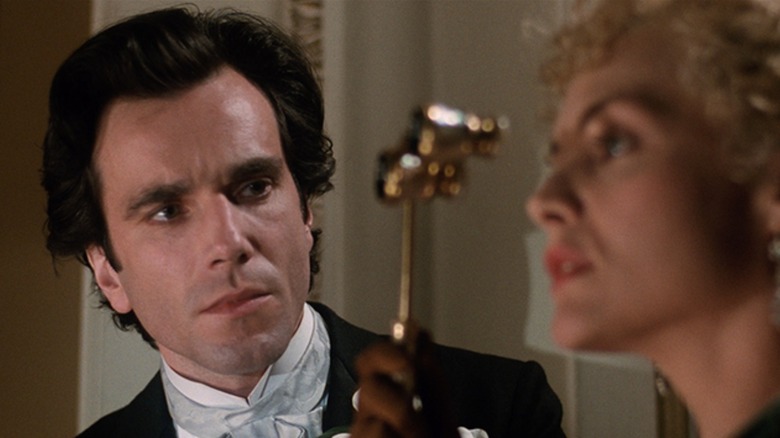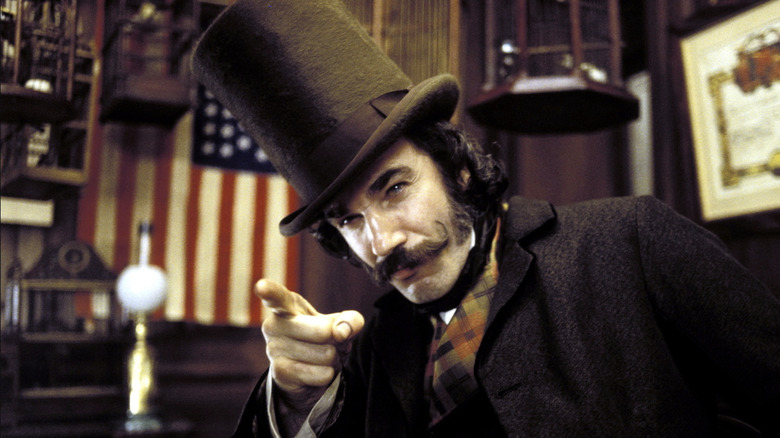The Martin Scorsese Film That Had A Deep Impact On Daniel Day-Lewis
Sir Daniel Day-Lewis is famous for many things, one of them being how selective he is with his roles. The British actor has only worked with three directors more than once: Jim Sheridan, Paul Thomas Anderson, and Martin Scorsese. However, Scorsese's influence on Day-Lewis began long before they worked together on "The Age Of Innocence" and "Gangs of New York." Day-Lewis still remembers seeing "Mean Streets," one of Scorsese's first movies, during its initial theatrical run in 1973 and the effect that the film had on him.
Daniel Day-Lewis' background
To understand why "Mean Streets" affected Daniel Day-Lewis so much, we must first understand the actor himself. Day-Lewis grew up in London, the son of Cecil, a Poet Laureate, and Jill, daughter of movie producer Michael Balcon. Speaking of his youth, Day-Lewis recalled a refusal to be a typical child of privilege:
"A house full of great books about art and literature was all well and good, but I was fascinated by the streets that were close by – Lewisham, New Cross and Deptford. I supported Millwall [Football club] with great gusto and was on the terraces every Saturday with the rest of the lads. It was through roaming the streets of Deptford that I started to understand this society we live in, which at the time coincided with a wave of dramatists who used the medium to break down the social barrier."
Day-Lewis' first experience acting on film came at 14 when he and his friends were cast as extras in the 1971 film "Sunday Bloody Sunday." Day-Lewis and two other boys got the "special job" of smashing cars on camera. Recalling the experience in 1988, Day-Lewis said he initially didn't connect "Sunday Bloody Sunday" with his already formed desire to be an actor.
"I can't say that, at that time, it sort of occurred to me that this was a beginning in films... I was already set on the idea of being an actor, but I sort of didn't make the connection with that. I had a very well-formed misconception about the theater and what it would provide and 'Sunday, Bloody Sunday' played no part in that. That was just wrecking cars, you know. Got an extra pound for that."
Mean Streets and why it matters
"Mean Streets" was Scorsese's third film. His debut, "Who's That Knocking At My Door?", can be seen as a beta test; both films are set in New York City and star Harvey Keitel as a conflicted anti-hero. His second, B-movie "Boxcar Bertha," had a more roundabout effect on "Mean Streets." After seeing "Bertha," John Cassavettes told Scorsese, "Marty, you've just spent a whole year of your life making a piece of s***. It's a good picture, but you're better than the kind of people who make this kind of movie."
A spurred Scorsese thus made a film inspired by his working-class upbringing as an Italian-Catholic in New York. "Mean Streets" focuses on Charlie (Keitel), a low-level Mafia associate having a crisis of faith. While trying to save his soul, he's also attempting to save his trouble-making cousin Johnny Boy (Robert De Niro). Despite these heavy themes and bursts of violence, the film has a hang-out vibe to it. Charlie's suggestion when one of his friends stiffs someone out of $20? "Let's go to the movies."
The greatest testament to "Mean Streets" is that a film so personal also managed to be universal. Just ask Daniel Day-Lewis:
"When [Martin Scorsese's] 'Mean Streets' came out, I was 16, and you cannot imagine the effect it had on me, a young and slightly wayward guy from south V C London. It was like a light going on in my head. It was so influential for me as a young person, never mind as a young actor."
Given Day-Lewis' fondness for running through the streets of London alongside his childhood friends, it makes sense he would relate to "Mean Streets." In the same interview, Day-Lewis describes Ken Loach as his "hero," and sure enough, Loach's films spotlight the British working class in the same way "Mean Streets" does for New York's.
Scorsese and Day-Lewis meet
By 1993, Scorsese and Day-Lewis had both come a long way in their careers, and they finally collaborated on "The Age of Innocence." Adapted from Edith Wharton's 1920 novel, the film is set in 19th century New York and chronicles the doomed love affair of Newland Archer (Day-Lewis) and Countess Ellen Olenska (Michelle Pfeiffer). Day-Lewis was initially skeptical about playing Archer, feeling he was "too English," but he accepted as he wanted to work with Scorsese. While filming "The Age of Innocence," Scorsese and screenwriter Jay Cocks realized Day-Lewis would be a good fit for another project they'd been working on: "Gangs of New York."
This was a film Scorsese and Cocks had spent decades trying to get made. Scorsese discovered Herbert Ashbury's book "Gangs Of New York" in 1970 and was enthralled by its telling of his hometown's history. After Scorsese purchased the film rights in 1979, it took 20 years for the movie to get off the ground thanks to difficulties in replicating 19th century NYC. "Gangs Of New York" ultimately premiered in 2002, 32 years after Scorsese first got the idea to make it and 9 since his last collaboration with Day-Lewis.
Day-Lewis came out of a 5-year acting hiatus to play Bill "The Butcher" Cutting in "Gangs." An anti-Irish gang leader, Cutting was an ironic role for Day-Lewis given his Irish paternal heritage. Regardless, he excelled. "Gangs of New York" isn't one of Scorsese's best, but it is one of Day-Lewis'. He's utterly magnificent as the Butcher; even when offscreen, he dwarfs Leonardo DiCaprio's protagonist Amsterdam Vallon.
New York City across generations
What unites "Mean Streets," "The Age of Innocence," "Gangs of New York"? They're all about the same city but at very different times. While "Gangs" concludes with Manhattan burnt to the ground, "The Age of Innocence" depicts New York birthed from the ashes. Likewise, while "Mean Streets" and "Gangs" follow street criminals, "The Age of Innocence" depicts the upper class. The variety of these films speaks to the versatility of New York as a setting and Scorsese as a storyteller. It's not every director who could make a film about Little Italy hoodlums that would speak to a teenager in London, but Scorsese is that director.
Day-Lewis was considered for the part of Father Ferreira in "Silence," but it ultimately went to Liam Neeson (who, funnily enough, played the Butcher's nemesis Priest Vallon in "Gangs.") With Day-Lewis' retirement, it seems the world will never see a third collaboration between him and Scorsese. However, the man himself admitted, "Martin [is] hard to resist." If anyone could coax Daniel Day-Lewis out of retirement a second time, it would be the director who inspired his teenage self back in 1973.
